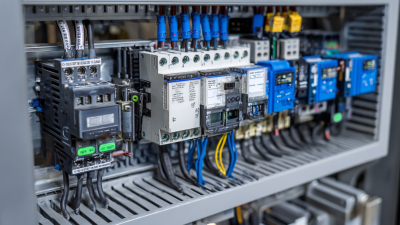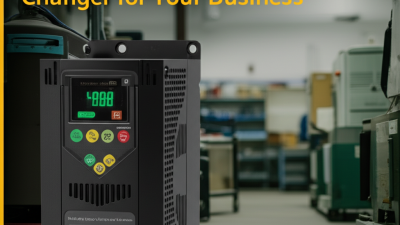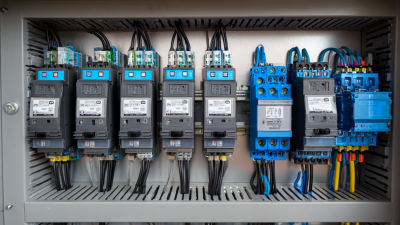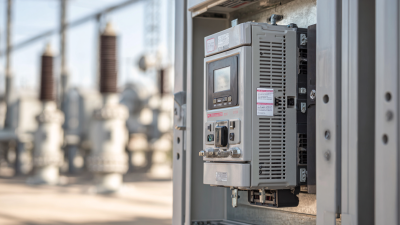Connect with us today to learn more about our industrial automation solutions—and how to commission them for your application.
Exploring Motor Frequency Converter Alternatives for Enhanced Energy Efficiency and Performance
As industries strive for enhanced energy efficiency and performance, the role of motor frequency converters has come into sharp focus. According to a recent report by MarketsandMarkets, the global market for motor frequency converters is expected to reach $16 billion by 2025, driven by increasing demand for energy-saving technologies across various sectors. These converters play a critical role in optimizing motor speed and torque, resulting in significant reductions in energy consumption—up to 50% in certain applications.

However, as industries explore alternatives to traditional motor frequency converters, innovative solutions such as direct drive systems and soft starters are gaining traction. This blog aims to delve into the alternatives available, assessing their potential benefits in terms of operational efficiency and sustainability, while also providing a comprehensive guide on how to effectively implement these alternatives in industrial settings.
Benefits of Motor Frequency Converters in Reducing Energy Consumption by up to 30%
Motor frequency converters are becoming increasingly essential in the quest for enhanced energy efficiency within various industries, particularly in smart shipping and electrified transportation. These converters can significantly reduce energy consumption, achieving reductions of up to 30%. According to industry reports, implementing efficient motor frequency converters can transform energy-intensive processes, cutting operational costs while also contributing to sustainability goals.
In the realm of hybrid power and propulsion systems, the advantages of integrating motor frequency converters are evident. They not only optimize motor performance by allowing precise control over speed and torque but also facilitate smoother transitions in power supply topologies. This is vital in applications ranging from electric vehicles to advanced ship propulsion designs, highlighting the role of advanced power electronics in enhancing overall energy efficiency.
**Tip:** When considering motor frequency converters for your application, analyze the specific operational requirements and choose a converter that aligns with the load characteristics.
**Tip:** Regular maintenance and calibration of motor frequency converters can further enhance energy efficiency and prolong the lifespan of the equipment.
Exploring Motor Frequency Converter Alternatives for Enhanced Energy Efficiency and Performance
| Alternative Technology | Energy Savings (%) | Performance Improvement (%) | Typical Application |
|---|---|---|---|
| Variable Frequency Drive (VFD) | 30% | 20% | Pumps and Fans |
| Soft Starters | 15% | 10% | Compressors |
| Servo Drives | 25% | 30% | CNC Machines |
| Speed Control Systems | 20% | 15% | Conveyors |
| Direct On Line (DOL) with Timed Control | 10% | 5% | Industrial Motors |
Innovative Alternatives: Exploring Soft Starters and Variable Frequency Drives in Depth
The demand for energy-efficient solutions in industrial applications is leading to a closer examination of alternatives to traditional motor frequency converters. Among these, soft starters and variable frequency drives (VFDs) stand out as innovative solutions that enhance both energy efficiency and performance. According to a report by the International Energy Agency, implementing VFDs can reduce energy consumption in electric motors by 20% to 50%, depending on the application. This significant reduction not only lowers operational costs but also contributes to a smaller carbon footprint.

Soft starters offer another layer of efficiency by minimizing the inrush current during motor startup, which can be as high as six times the full-load current for an electric motor. According to research conducted by the Electric Power Research Institute, using soft starters can extend motor life and reduce maintenance costs—an attractive proposition for industries that rely heavily on electrical machinery. By controlling acceleration and deceleration rates, soft starters help mitigate mechanical stress and enhance overall system performance, making them an ideal choice for various applications, from conveyor systems to fans and pumps. With these innovative technologies, industries can achieve optimal performance while significantly enhancing energy efficiency.
Comparative Analysis of Energy Efficiency Metrics for Conventional vs. Advanced Solutions
In the quest for enhanced energy efficiency within industrial applications, the choice between conventional motor frequency converters and advanced solutions is critical. Recent reports indicate that advanced frequency converters can improve energy efficiency by up to 30% compared to their traditional counterparts. According to a study published by the International Energy Agency (IEA), motors and drives account for nearly 70% of industrial electrical consumption, highlighting the potential for significant energy savings when modern technologies are employed.
Tip: When evaluating motor frequency converters, consider not only the initial cost but also the long-term energy savings and maintenance requirements. Investing in advanced solutions may yield a higher return on investment over time.
A comparative analysis of efficiency metrics reveals that advanced motor frequency converters often feature enhanced control algorithms and superior materials, leading to reduced power losses and optimized performance. The Global energy management report forecasts that the adoption of such innovative converters could reduce global energy demand by 10% by 2030. This emphasizes the importance of selecting the right technology for achieving sustainability goals.
Tip: Regularly monitor and analyze the energy consumption of your systems to identify potential improvements. Adopting a proactive approach in managing energy usage can lead to additional cost savings and increased sustainability.
Case Studies: Successful Implementation of Frequency Converter Alternatives in Various Industries
The landscape of frequency converter alternatives is rapidly evolving, with various industries reaping significant benefits from innovative implementations aimed at enhancing energy efficiency. A notable example can be seen in the rubber industry, where high energy consumption has long posed a challenge. With increasing pressure to transition towards greener practices, companies are actively exploring alternatives that not only reduce energy costs but also improve operational performance. For instance, a prominent tire manufacturer in Shandong has adopted specialized permanent magnet frequency converters, demonstrating a promising 12% increase in efficiency.
These case studies highlight the importance of tailored solutions in addressing specific industry needs. As the global frequency converter market is projected to grow from $25.65 billion in 2024 to $45.31 billion by 2031, the demand for alternatives that deliver enhanced performance and energy savings is on the rise. The initiatives undertaken by leading companies serve as a testament to the transformative potential of advanced frequency converter technologies, paving the way for more sustainable practices across sectors.
Energy Efficiency Improvement Through Motor Frequency Converter Alternatives
This chart illustrates the performance improvements and energy savings achieved by various industries through the implementation of alternative motor frequency converters. The data showcases the percentage increase in energy efficiency and performance metrics post-implementation across several sectors.
Future Trends: Integrating IoT Technologies with Motor Frequency Conversion for Optimal Performance
The integration of IoT technologies with motor frequency converters is poised to revolutionize the way we enhance energy efficiency and performance in industrial applications. By embedding sensors and connectivity into motor systems, operators can monitor energy usage, equipment health, and performance metrics in real-time. This data-driven approach not only facilitates predictive maintenance but also optimizes operational efficiency, ultimately reducing energy consumption, lowering costs, and extending the lifespan of machinery.

As industries embrace Industry 4.0 principles, the role of intelligent motor frequency converters will become increasingly pivotal. IoT-enabled devices can adjust motor speeds dynamically based on operational demands, environmental conditions, and production schedules. This level of responsiveness allows for significant energy savings and minimizes waste. Moreover, with advanced data analytics, users can make informed decisions, enhancing overall performance and ensuring that systems operate within optimal parameters. The future of motor frequency conversion lies in this symbiotic relationship with IoT, transforming traditional practices into smart, efficient solutions that meet the modern demands of the industrial landscape.
Related Posts
-

Exploring Innovative Alternatives to Frequency Drive Controllers for Enhanced Performance
-

7 Unique Benefits of Using Electromagnetic Brakes for Motor Applications
-

7 Reasons Why the Best 220v VFD Single Phase is a Game Changer for Your Business
-

Discover High-Quality 220V VFD Single Phase Solutions from Leading Chinese Manufacturers
-

A Comprehensive Comparison of 220V VFD Single Phase Drives for Optimal Motor Performance
-

Unlocking Efficiency in Industrial Applications How to Use the Best Single Phase to 3 Phase Converter VFD